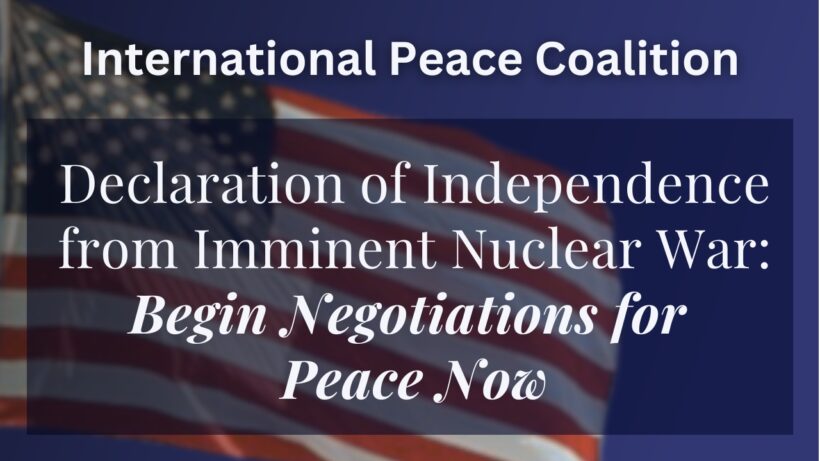July 4—We, the undersigned, welcome the renewed peace initiative of the President of the Russian Federation, Vladimir Putin, as currently presented in his speech at the Russian Foreign Ministry on June 14, 2024. We urge the commencement of a diplomatic process forthwith, not withstanding the present state of hostilities between NATO/Ukraine and Russia.
Time is of the essence. Any further escalation heightens the danger that the present conflagration will escalate to the level of region-wide war or even thermonuclear confrontation, and that far more quickly than might be imagined. To ensure that this does not happen, we should follow this advice: “Let us never negotiate out of fear. But let us never fear to negotiate. Let both sides explore what problems unite us, instead of belaboring those problems which divide us.”
Those words, of American President John F. Kennedy, were echoed by his adversary, Russian Premier Nikita Khrushchev, in a letter he wrote to JFK:”I have participated in two world wars, and know that war only ends when it has carved its way across cities and villages, bringing death and destruction in its wake.” That has been the unnecessary toll in this war, a war that could have concluded over two years ago, by the end of March, 2022. Instead, through the clearly-documented intervention of the UK’s Boris Johnson and NATO, the already-negotiated proposal for peace between Russia and Ukraine was scuttled. Hundreds of thousands of lives were unnecessarily sacrificed as a result.
The Putin June 14, 2024 proposal is the world’s opportunity to “get back on track.” It could prove the first step in creating a new international strategic architecture, to replace the now-dead post-1989/91 “unipolar” construct. This June 14 peace initiative is a successor to a series of failed, sabotaged, but persistent peace attempts, as openly documented to the world in the conclusion and attempted implementation of Minsk-2 in 2015, as well as in the willingness to negotiate even after the commencement of Russia’s Special Military Operation, February 24, 2022. It was seen in the March, 2022 treaty that was initialed by both Russian and Ukrainian official representatives, but never adopted, because of Boris Johnson’s imperial intervention.
We here declare, emphatically, that the goal of dismembering Russia by using the Ukraine conflict as a springboard for regime change there, is clearly a madman’s enterprise in the era of thermonuclear weapons. In view of the suffering caused by war and aggression, and the danger of this conflict escalating into a Third World War, broad support for this initiative is an important expression of the will of all rational people to survive.
The war-mongering, and profit and revenge-driven calls for Russia to be defeated, are based on the mistaken assumption that the theater of war—including nuclear war—can be limited. This was not, however, the case in either the First or Second World Wars. Through today’s military capabilities, which can reach any target in the world in the shortest possible time, such a “limited war” assumption is evidence of a huge misjudgment of the reality of our time. Those calling for war, and against negotiations, mistakenly believe that they might have a safe chance of survival. In thermonuclear war, there is no hiding place.
To repeat: We urge the commencement of a diplomatic process forthwith, notwithstanding the present state of war between NATO/Ukraine and Russia. To this end, we urge the Ukraine Rada to rescind the order preventing direct negotiations with Russia. We fully support the construction of a new security architecture for Europe and indeed for the world. We urge the warring parties – and those in supporting roles – to come together in good faith to negotiate a lasting peace based upon mutually beneficial economic relationships among the countries involved.
Specifically, we recommend the following steps:
First, to begin initial discussions, based upon the Russian peace proposal of June 14, 2024.
Second, based on progress in those initial discussions, to seek the earliest possible declaration of an agreed-upon ceasefire in the conflict.
Third, once an agreed-upon ceasefire’s terms have been set to paper, reinforce and strengthen trust through a new economic architecture, including forces from outside of the conflict that have advanced various proposals for advancing peace.
We must, with regard to these negotiations, not only remember but re-commit to the lessons of the Peace of Westphalia that ended the Thirty Years War: a lasting peace requires that one take into account “the interest of the other, ” and all others, for that matter. “No problem of human destiny is beyond human beings.” That was the conviction of Kennedy and Khrushchev, who as leaders, faced a moment when they, together, might have destroyed all human life, perhaps forever. They negotiated, and humanity prevailed. We stand, perhaps not yet in, but very close to that very same place now. We must not fail.
Col. Lawrence B. Wilkerson (ret.), Former Special Assistant to the US Chairman of the Joint Chiefs of Staff, Former Chief of Staff to the US Secretary of State
Kirk Wiebe, Member of the Veteran Intelligence Professionals for Sanity (VIPS), and a former senior analyst with the National Security Agency. He’s also a partner in the prevention of crimes of the intelligence community with Bill Binney.
Dr. Clifford Kiracofe, Former Senior Staff Member, U.S. Senate Committee on Foreign Relations, and President, Washington Institute for Peace and Development
E. Martin Schotz, Member of JFK Peace Speech Committee
Helga Zepp-LaRouche, Founder Schiller Institute






